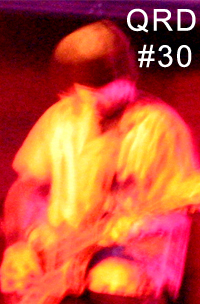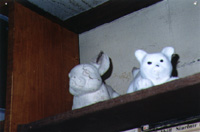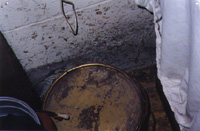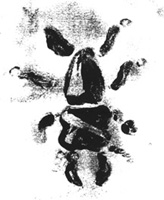









May 5, 2006
We've been friends with Jim for quite a while. He runs a really interesting record label called The Ceiling & has an experimental band called The Infant Cycle. He stared recording with the same Tascam 464 four-track recorder that was used by Remora & Lycia & a lot of other folks.
QRD – How did you get into sound sculpture style music? Did you start out in traditional rock bands?
Jim – Yeah, definitely. I was classically trained on piano for almost a decade, but I ended up playing drums in a lot of bands; one was with Paul Verma (Plasmalamp), and I played in a few with Jared Davison (I played in less-conventional projects with both later). I played bass in a couple of others. I was obsessed with old, unusual psychedelic records since I was very young, which helped me hear things differently, and it took me having to unpeel these layers of musicianship and structure I had acquired to start dealing with things in an almost naive way, back to when I was playing with broken tape recorders and radios when I was a child....
QRD – A lot of bands that do music in the sound sculpture type format rely heavily on their computers for sound manipulation, but Infant Cycle mainly sticks to processing real sounds – how do you think this both benefits & limits you?
Jim – Working on computers doesn’t really excite me. I use them for mastering once the piece is generally done, and they make certain things much easier (some of the editing etc.). It’s a difficult question to answer, however, as I’ve just always worked with what is available to me, and once a piece of equipment is here, I keep it forever, and I work within its limitations, and try to push it as far as it can go. I’ve found that even with equipment that a lot of people find limited, the possibilities are endless....
QRD – When writing a piece for the Infant Cycle, what is your starting point?
Jim – I improvise, write, and experiment, and then record and mix whatever results I end up with, usually from multiple angles. Gradually I start to see where things can be cut or combined, and I often let things sit for a long time until the pieces of the puzzle come together with something else I did.... I sometimes take naps thinking about the music, and then wake-up with the answer. Most people I know start at the beginning and work from the ground up, but the way I work, I start somewhere in the middle and work outwards in every direction. I let the sounds themselves influence the overall structure of the track.
QRD – What’s your effect set-up for your guitar?
Jim – I usually record it dry. I haven’t changed the strings in twenty years, and sometimes they break (and don’t get replaced), changing how I use it. Only one pick-up works... sometimes. I tune it whichever way I want it at that point. I’ll sometimes work on the recording with processors and old pedals or manipulating the tape or mini-disc, or with speakers inside of objects I’ve constructed. I sometimes intentionally use bad cords – I like the way it sounds...
QRD – What do the other musicians in your area think about the music that you do? Are you part of their community or kind of more part of an international community?
Jim – I don’t know too many musicians in this city. I just moved here a few months ago. I did some work with Aron of Tropism, and Rich Oddie of Orphx and I are talking about doing some more work together. A few people from Toronto (which is about an hour bus ride away) are talking about coming over. But somewhere about seven or eight years ago, a lot of my output did become more focused on an international level.
QRD – What do you think the average Infant Cycle fan does for a living?
Jim – I like to think Infant Cycle fans are above average!
QRD – What’s a record you listen to that would surprise people who listen to your music?
Jim – A lot of what I listen to regularly are dubs from the ‘70s by King Tubby, Lee Perry, Scientist etc. I also like Capt. Beefheart a lot, Nico, Stooges.... I just picked up Coltrane’s A Love Supreme, and I really like that one...
QRD – Do you have any music projects currently going on besides The Infant Cycle?
Jim – I’m doing some collaborations, but I’m not sure what they will come out as. I’ve kept the name The Infant Cycle for my own stuff. I’m not concerned if each thing sounds wildly different from the last, so I don’t have a thousand pseudonyms for each facet of their output, like some artists do.
QRD – Why did you start The Ceiling?
Jim – Everybody needs a home base, and The Ceiling is mine: a label, mail-order, office, studio, whatever I want it to be. I’d already had a difficult history with some labels, businessmen, and I felt that having something of a solid base would make it easier to work. However, it’s a solid base that can be still very amorphous, and change if I need it to. And “solid base” may be the wrong term for a situation that has been as accident-prone as it has.
QRD – Most of The Ceiling’s catalog is in ultra-limited editions. Is it for financial reasons, aesthetic reasons, or both?
Jim – Both, though part of the fun is what can we pull off with very little means? That’s part of where the name The Ceiling comes from. And I’ve always liked the rough edges, rather than a slick product, so the money isn’t that big an issue.
QRD – I know you do a lot of lathe cut records. Do you get them from New Zealand?
Jim – Yes, they were done by Peter King. I was looking into getting a record-cutter for myself, but that was one of those ideas that floats off and never lands anywhere...
QRD – Do you think vinyl is still a valid & important format?
Jim – Yes, but not for the same reasons as, say, 25 years ago. I think that acquiring and listening to music on CD or MP3 is so easy now that it is disposable... you can just jump tracks, or delete an MP3 off the computer. Vinyl does require more of a commitment from the listener, just in the manner of playing it, keeping it.... And I do think it sounds better....
QRD – I really like that your vinyl releases come with a CD-R of the music. Was this your idea or did it come at the request of fans?
Jim – I should maybe clear up a little bit of confusion here – the last CD-R we did was about to be a record, but we scrapped that and made it a CD-R release instead (but still made it look like a record). The vinyl releases have been vinyl-only, though it’s not out of the question of doing both formats in the future... I did consider the possibility.
QRD – In an era where artists can put up their own MP3s on the internet & somewhat promote their music themselves to a wide market, what do you think the job of a small indie label like yourself has become?
Jim – Actually, I’m not sure if what I’m doing has changed that much since the days of cassettes and paper fanzines... the mediums have changed (and with it, many pros and cons), but how this has affected things in the big picture, I’m not sure. I think it’s too early to tell. I do get a kick out of certain online types who think they invented DIY, however, ha-ha.…
QRD – How do you decide what artists to work with on your label?
Jim – Well, for the past few years, it has only been Infant Cycle recordings, or something related to that. I was releasing music from others, but I got rather overworked.
QRD – If you were able to work on The Ceiling full-time & had unlimited finances, what would you do differently?
Jim – Well, I would stop and figure out how to deal with having money. It’s a foreign concept to me.
QRD – What stereotype of musicians are you most annoyed by people associating with you?
Jim – I can’t really say any – I don’t encounter them. I don’t tell people what I do, because for most people, it’s beyond what they’ve encountered.
QRD – What’ve been the best & worst musical gear purchase you’ve ever made?
Jim – Truth be told, I can’t think of anything I have that I haven’t found useful and interesting, even if I got something other than what I thought I could do with it. I’ve been having to get some stuff repaired by Tascam, and now I’m regretting that company, because it has disappeared for months and months, which has slowed things to a standstill. The best would probably be my first Tascam 464 four-track (when I had barely anything else), because that was where things started to happen. Another limited thing, that once you looked at it, becomes extremely versatile as an instrument, especially things they designed to save space on the machine.…
QRD – What piece of gear are you currently lusting after?
Jim – Actually, Tascam equipment repair issues aside, I really don’t need or want anything. I’d rather spend the money and get some other things repaired, but that’s off in the future.… My amps have been busted for the past decade, so what’s another one?
QRD – Anything else?
Jim – Thank you Brian for the interview...
You made me think a little! Some things discussed in this interview
can be found at: www.theceiling.ca







